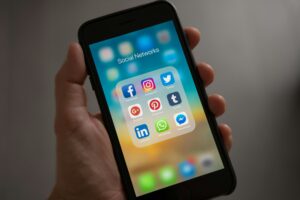
In today’s digital age, social media has become an integral part of our daily lives. While platforms like Instagram, Facebook, and TikTok allow us to connect and share, they also significantly impact our mental health, particularly through the lens of self-comparison. This article explores the relationship between social media usage, mental health, and self-comparison, providing insights and tips for healthier online habits. At Killian Counseling Services, we’re dedicated to supporting you in navigating these challenges.
Understanding the Connection: Social Media and Mental Health
Social media can be a double-edged sword. On one hand, it fosters connections and provides a platform for self-expression. On the other hand, it can lead to feelings of inadequacy, anxiety, and depression. Research indicates that excessive social media use is linked to increased rates of anxiety and depressive symptoms, especially among young people.
The Role of Self-Comparison
One of the key factors in this relationship is self-comparison. When we scroll through curated feeds of seemingly perfect lives, it’s natural to compare ourselves to others. This comparison can lead to feelings of low self-esteem and dissatisfaction. A study published in Cyberpsychology, Behavior, and Social Networking found that individuals who frequently engage in social comparison are more likely to experience negative emotions and lower life satisfaction.
The Highlight Reel Effect
Social media often showcases a “highlight reel” of people’s lives—vacations, achievements, and celebrations—while mundane realities are left unshared. This selective sharing can distort our perception of reality, leading us to believe that others are living happier, more fulfilling lives. As we compare our everyday struggles to these idealized portrayals, it’s easy to fall into a cycle of negativity.
Strategies for Healthy Social Media Usage
To mitigate the negative effects of social media on mental health and self-comparison, consider the following strategies:
1. Curate Your Feed
Be intentional about who you follow. Choose accounts that inspire and uplift you rather than those that provoke feelings of envy or inadequacy. Unfollow or mute accounts that contribute to negative self-comparison.
2. Set Boundaries
Limit your time on social media to reduce its impact on your mental health. Consider setting specific times for social media use or utilizing apps that track and limit screen time.
3. Practice Mindfulness
Stay present and engaged in your life outside of social media. Mindfulness practices, such as meditation or journaling, can help ground you and cultivate a sense of gratitude for your own experiences.
4. Focus on Authenticity
Share your authentic self online. By embracing vulnerability and sharing your struggles alongside your successes, you can contribute to a more realistic representation of life that others can relate to.
5. Seek Support
If social media use is significantly impacting your mental health, consider speaking with a mental health professional. At Killian Counseling Services, our compassionate team is here to provide the tools and support you need to navigate feelings of inadequacy and enhance your overall well-being.
Conclusion
While social media can enrich our lives, it’s essential to recognize its potential impact on mental health and self-comparison. By cultivating mindful usage and prioritizing authentic connections, we can create a healthier relationship with social media. Remember, you are not alone in your feelings, and it’s okay to seek help when needed. At Killian Counseling Services, we are committed to helping you build resilience and positivity in both your online and offline life.